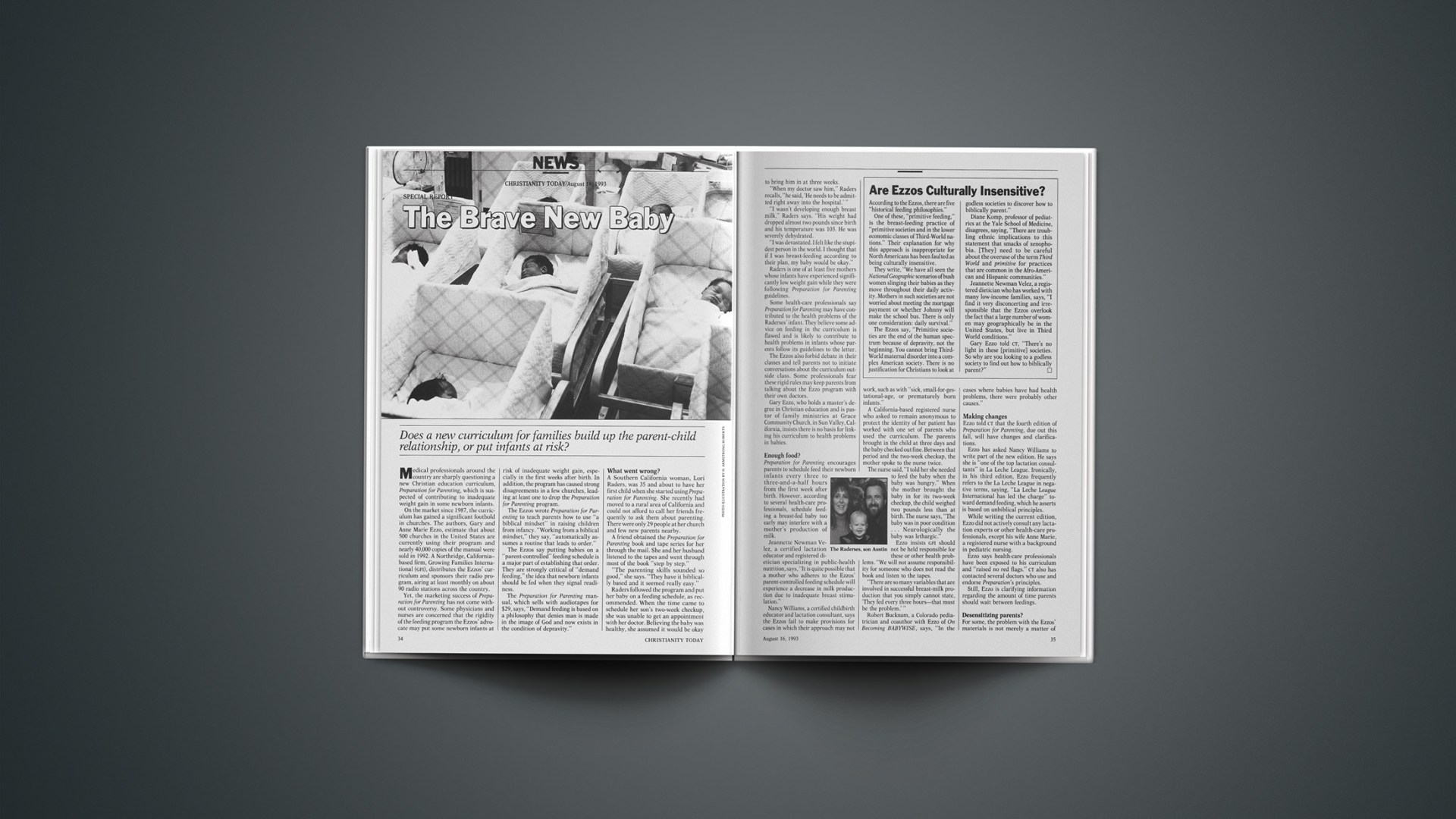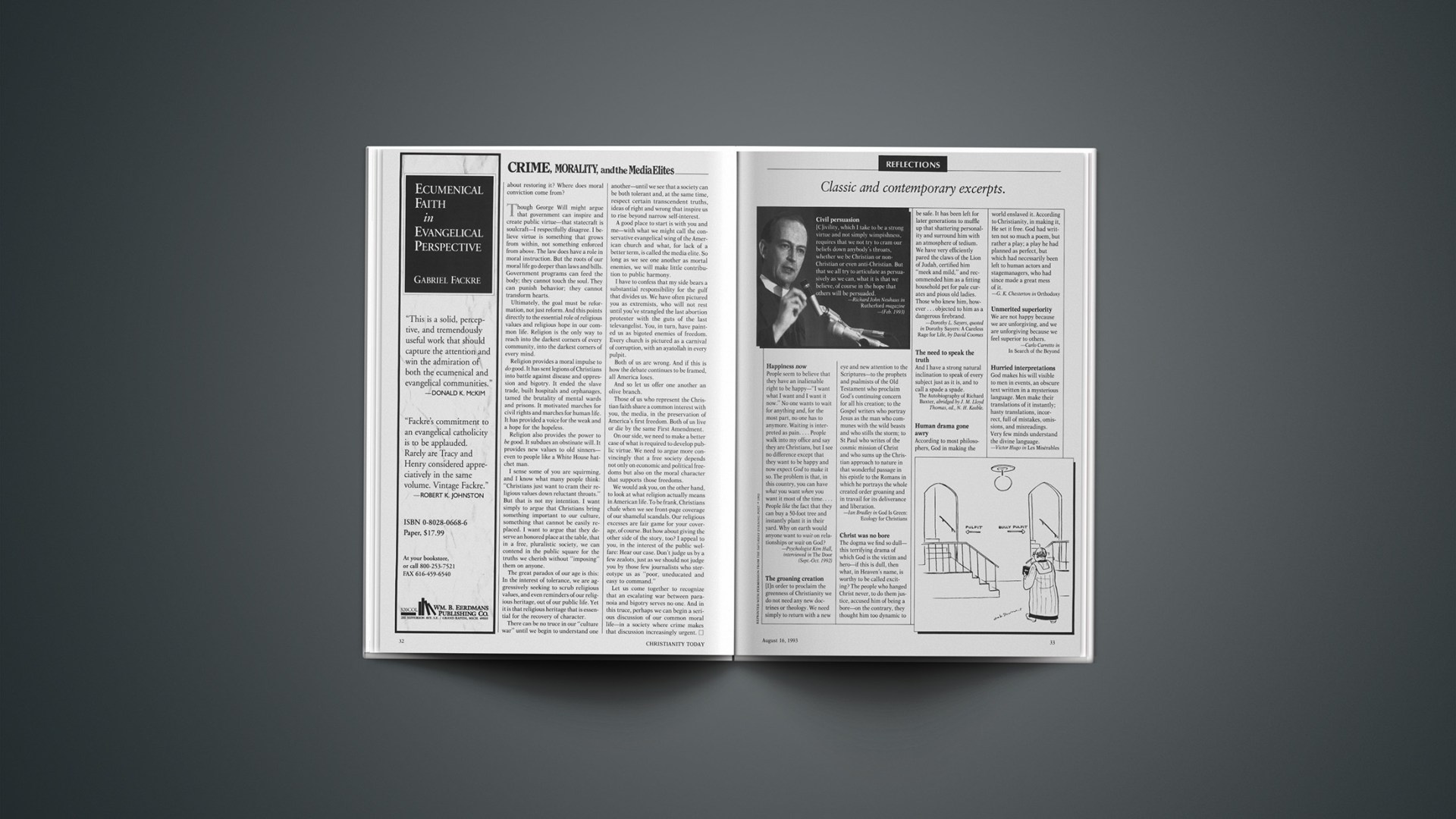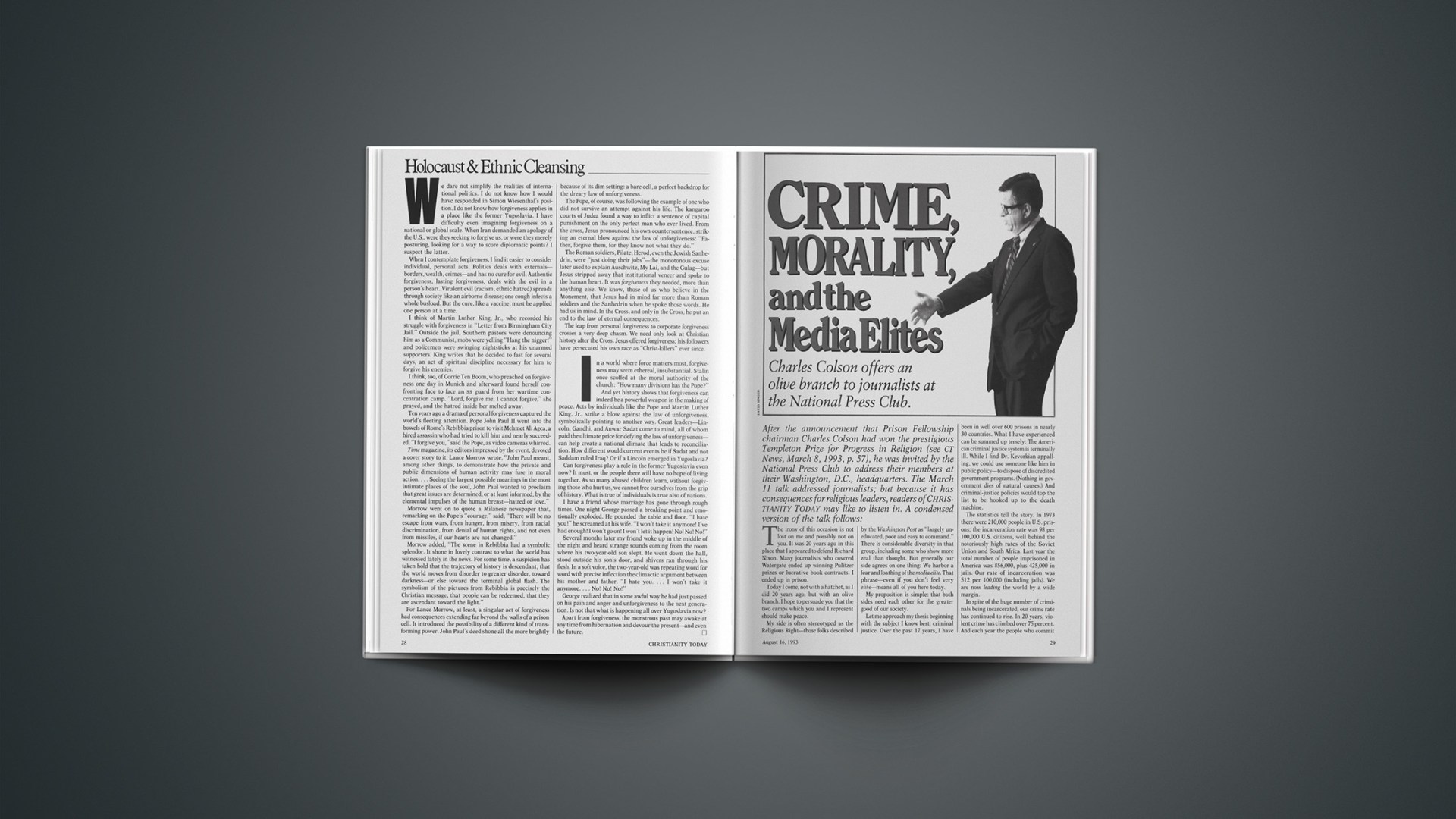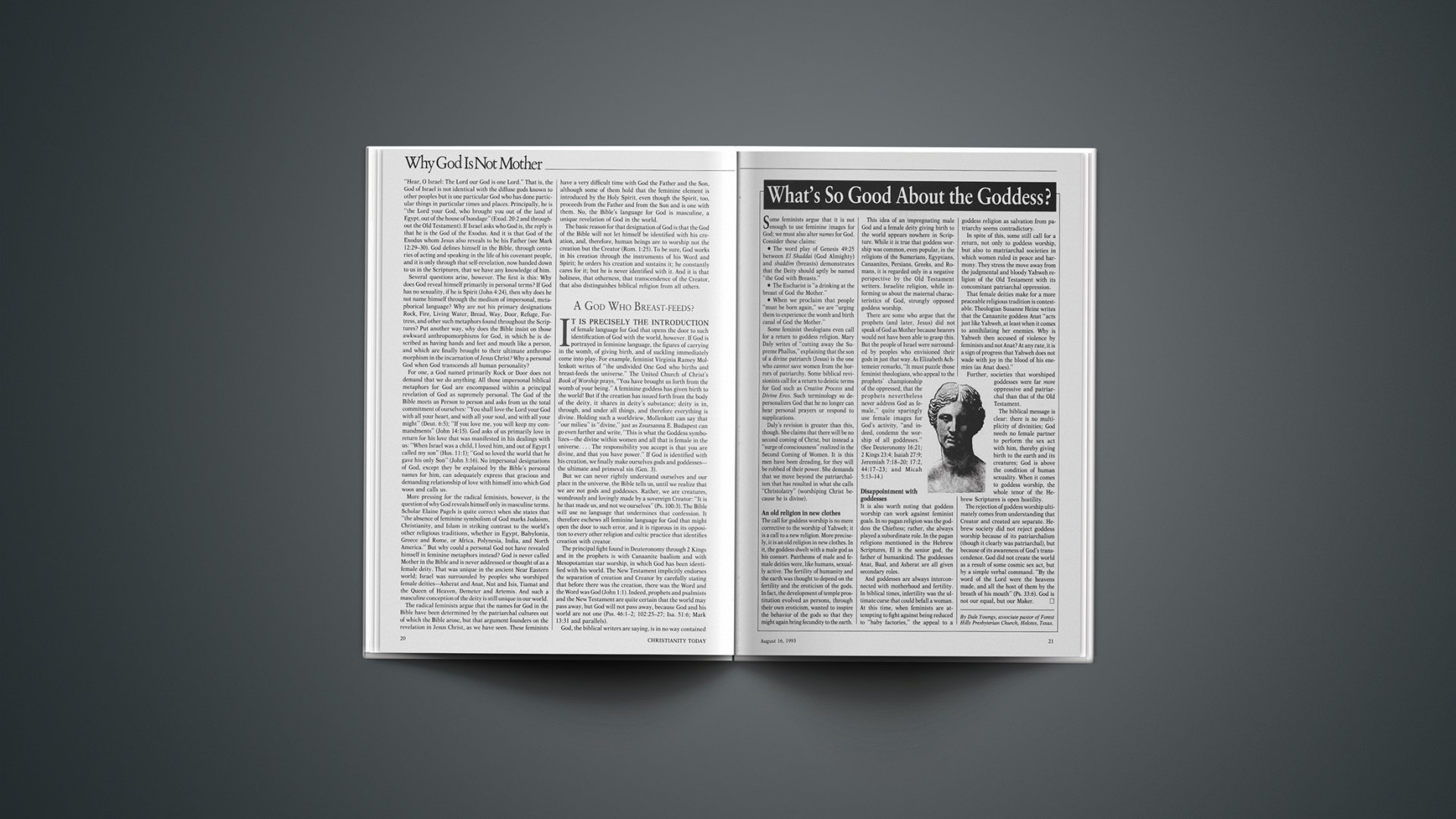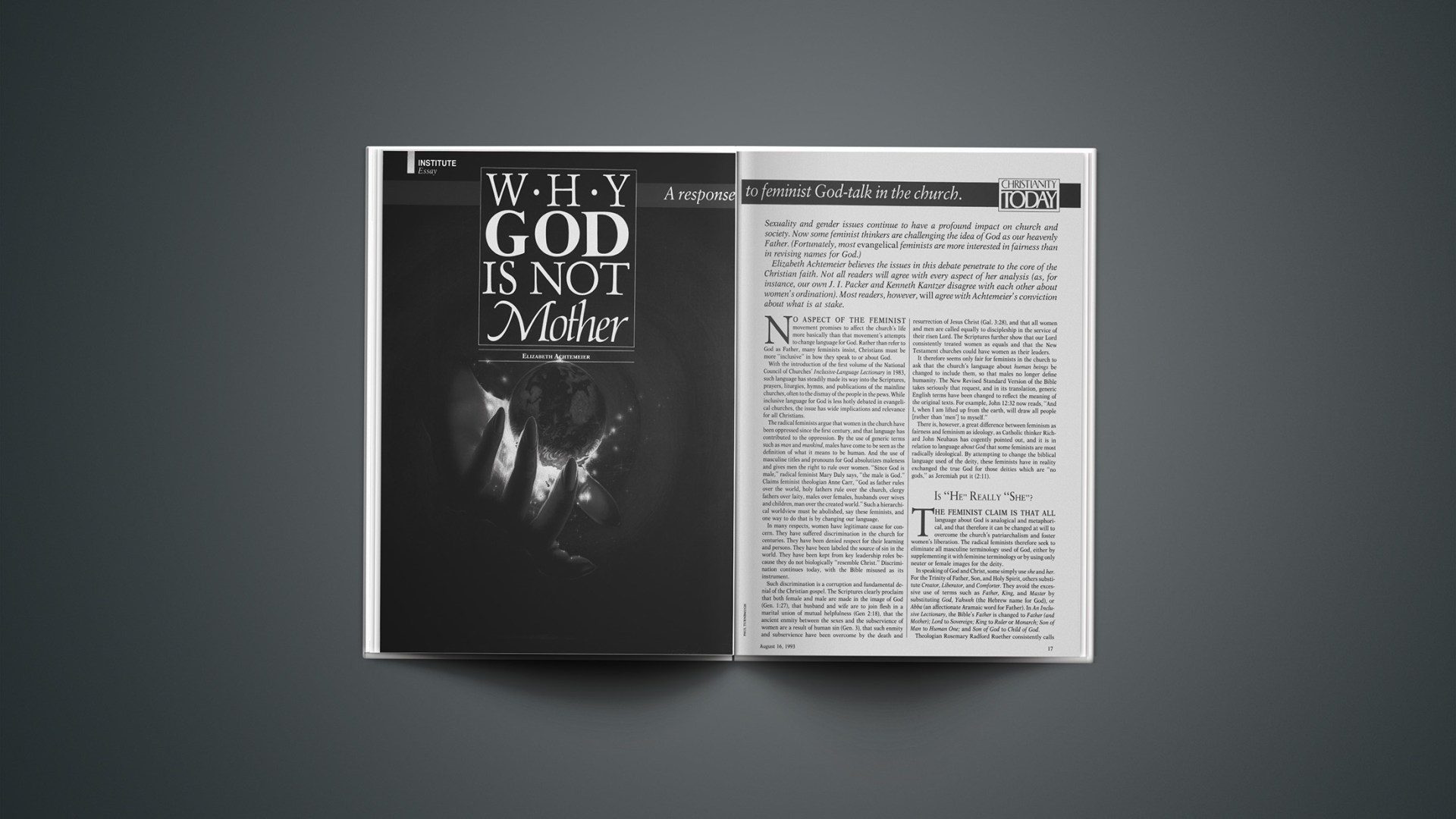ROMAN CATHOLICS
Parishioners Evicted from Church
Defiant parishioners of Saint Joseph’s Roman Catholic Church in Worcester, Massachusetts, have been escorted by police from the church they occupied for 13 months.
Worcester diocesan Bishop Timothy Harrington, 74, had ordered the brick church closed last year because of structural safety concerns. But 45 churchgoers, many of them elderly, began around-the-clock occupation of Saint Joseph’s on May 25, 1992. They slept in sleeping bags on pews and on air mattresses on floors.
They also kept holding services, although Harrington never responded to weekly pleas to provide a priest to say Mass. Harrington had ordered the French Canadian church to merge with another one about a mile away, saying $700,000 in needed plaster and brick repairs at Saint Joseph’s would be too costly. Parishioners had raised more than $600,000 in pledges for repairs, but Harrington said he was “reluctant to impoverish the people of Saint Joseph with a debt I did not feel you could handle.”
The issue came to a head June 22 when a Superior Court judge agreed with Harrington and found the church members in contempt of court.
OREGON
Anti-Gay Rights Measures Pass
Two cities and four counties in Oregon passed antihomosexual-rights initiatives in June. The measures—some approved by as much as a 3-to-1 margin—prohibit local governments from promoting homosexuality and bar laws protecting homosexuals from discrimination.
The measures were part of a new strategy by the Oregon Citizens Alliance (OCA), which failed last year to win statewide approval of a more strongly worded initiative, Proposition 9. “All the editorial pages are still against us—big time,” says Lon Mabon, the organization’s director.
The alliance is targeting communities where Proposition 9 carried a majority of the votes in the November 1992 balloting.
The measure, dubbed “Son of 9,” was approved by majorities ranging from 56 percent in the city of Canby to 73 percent in Douglass County. Mabon says several more communities will vote on such measures this fall.
HIGHER EDUCATION
The Ultimate Christian U.
In secular academia, “Christian scholarship” is often regarded as a contradiction in terms. Outside the evangelical subculture, Christian scholars by and large feel they get little respect.
D. Ray Hostetter’s solution to the problem is to create the ultimate Christian university, complete with the whole gamut of master’s level and doctoral programs. According to Hostetter, president of Messiah College in Grantham, Pennsylvania, that university would rival major secular universities in terms of “quality and intellectual climate.” Based on a Christian world view, it would integrate all major fields of learning.
In a 24-page paper, Hostetter recently outlined his vision for a group of some of the world’s most prominent evangelical scholars.
George Marsden, history professor at Notre Dame, said the venture would face “deeply entrenched and powerful institutional and cultural forces” arrayed against a Christian university’s efforts to gain recognition. Nicholas Wolterstorff, professor of philosophical theology at Yale University, cited evangelicals’ responses to evolution and higher biblical criticism as having done the most damage to the movement’s intellectual credibility.
The biggest problem that stands in the way of Hostetter’s dream is money. In his paper, Hostetter estimates it would take $25 million just to get the university off the ground and “manyfold that amount” to develop it fully.
Although Messiah College has authorized Hostetter to continue his efforts, for now the vision is still a dream.
TELEVISION VIOLENCE
Wildmon Targets New Cop Show
Boycott-minded Donald Wildmon (CT, Aug. 19, 1991, p. 14) has a new number-one enemy: Steven Bochco’s “NYPD Blue,” scheduled to debut in September on ABC.
Wildmon, president of the American Family Association, says in full-page ads in USA Today, the New York Times, and other newspapers, “It is time to draw the line.”
Wildmon went to war when Bochco announced that his new series would be the first R-rated show on network television. Wildmon is seeking a petition drive, and advertisers and affiliates already are edgy, with some vowing to drop out if changes are not made. Bochco has boasted that the show will break nudity and profanity barriers.
“NYPD Blue” is facing objections from another front—the federal government—for violence. A Senate judiciary subcommittee headed by Paul Simon (D.-Ill.) summoned television executives in June and warned them to tone down the murder and mayhem depicted on the tube or face legislative restrictions.
Networks responded by promising to implement a “parental discretion” warning system before and during violent shows in the fall. Only one has been deemed deserving of their label—“NYPD Blue.”
PEOPLE AND EVENTS
Briefly Noted
After repeatedly criticizing Ronald Reagan during his eight years as President, the National Council of Churches (NCC) has recruited him as a fundraiser. Reagan, Jimmy Carter, and Gerald Ford will cochair a Christian unity project designed to raise $10 million for the organization. In 1981, the NCC said Reagan’s domestic policies “threaten the vision of America as the model and embodiment of a just and humane society.”
• The U.S. Senate by voice vote on June 30 confirmed President Clinton’s appointment of Boston Mayor Raymond Flynn as U.S. ambassador to the Vatican. Only Sen. Jesse Helms, (R-N.C.) who, like Clinton, is a Southern Baptist, voiced opposition on the grounds that “the United States has no business sending an ambassador to any religious entity.” Several denominations and groups opposed the appointment (CT, April 26, 1993, p. 52) because of church/state concerns. Flynn, a prolife Democrat, also was opposed by two-dozen women’s-rights and population-control groups.
• John Carter Adams is the new executive director of Olive Branch Mission, Chicago’s oldest social agency for the homeless. Adams was general manager of the New York Bible Society for ten years.
• Tampa Bay Theological Seminary in New Port Richey, Florida, will become a branch of Dallas Theological Seminary next fall. Professors from both schools will share duties at the Tampa branch.
• First Baptist Church of Atlanta pastor Charles Stanley, who is heard nationally on “In Touch” television and radio broadcasts, announced in July that his wife of 38 years had filed for “separate maintenance.” Stanley, who asked his congregation to pray “that God would heal [his] marriage,” will continue his pastoral and broadcasting activities.
• Trustees at Multnomah School of the Bible in Portland, Oregon, have approved changing the name of the school to Multnomah Bible College for its undergraduate division and Multnomah Biblical Seminary for its graduate division.
• Kenneth E. Zindle resigned June 30 as bishop of the Evangelical Lutheran Church in America’s (ELCA) Slovak Zion Synod following allegations by two women of sexual harassment. Zindle said the charges were baseless and he leaves “in disgust for the way that this matter has been pursued.” The Slovak Zion Synod is the ELCA’s only synod organized on an ethnic rather than geographic basis.
• Thomas Blevins, head of the ELCA’s Department of Synodical Relations, resigned his post July 9 following charges of sexual abuse filed by the denomination’s Northwest Washington Synod. Blevins, 52, denies allegations made by a woman in January.
• Thad Gaebelein has been named headmaster at the Stony Brook School, a Christian preparatory school on Long Island founded by his grandfather, Frank Gaebelein, a former CT editor.
• Bruce Dunn, host of “Grace Worship Hour,” on radio since 1951 and on television since 1974, died July 15 of a heart attack. Dunn, 74, had been pastor of Grace Presbyterian Church in Peoria, Illinois, for 40 years.
EXODUS INTERNATIONAL
Ex-Homosexuals Find New Purpose
In contrast to the ongoing explosive debate about homosexuality in other arenas, a conference last month attended by nearly 600 people involved in the Christian ex-homosexual movement Exodus International seemed tranquil. Exodus, an umbrella organization for 70 groups in 33 states and several foreign countries, offers healing and support for men and women trying to overcome homosexuality.
“It was worth it—I got a sense of something I didn’t have at all, getting to know who God the Father is,” said 26-year-old Roger Tritapoe, a former prostitute from Virginia. “There was hardly any father relationship with my dad, an alcoholic, so it’s hard to get in touch with God as Father.”
Unlike Exodus conferences in San Diego last year and in Toronto the year before, there were no protests by homosexual organizations. In contrast, this year’s participants at Asbury Theological Seminary only had to contend with curious rural Kentucky teens asking about homosexuality.
Seminars at the conference included how to counsel transvestites, genetic factors in homosexuality, and marriage for former homosexuals. Attendees included pastors, clinicians, and former homosexuals.
By Angela Winter Ney in Wilmore, Kentucky.
IOWA
Carrier Rejects ‘Sinful’ Mail
A substitute postal carrier’s refusal to deliver copies of Time and Newsweek he considered “sinful and decadent” led to his resignation from his route in June.
Gordon Yoerger, a Roman Catholic, informed his postmaster that he would deliver all of his mail June 15 except copies of the two magazines. Time’s cover showed a scantily clad child prostitute; Newsweek’s cover photo featured two lesbians.
When he returned from his route, he was informed that he would have to deliver the magazines the next day or be dismissed. He quit. According to Yoerger, “If keeping my job meant delivering my customers into the mind of Satan by tempting them to sin at least in thought, I could not in good conscience do it.”
Yoerger explained his actions in a letter to the Moville Record. “In the end, I think that no one, not even the United States Post Office, is above moral necessity.”





